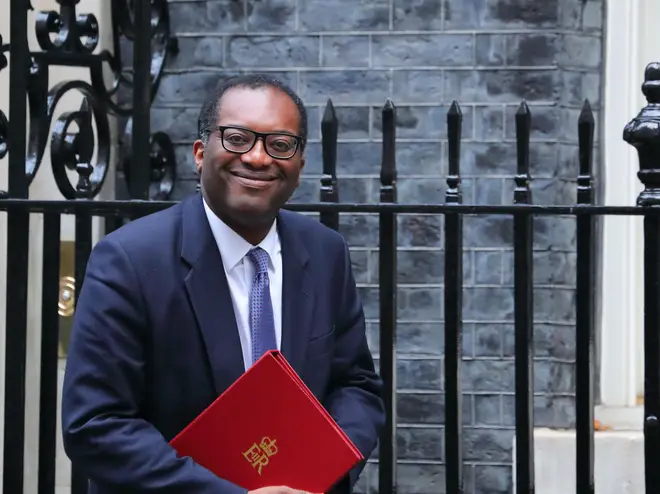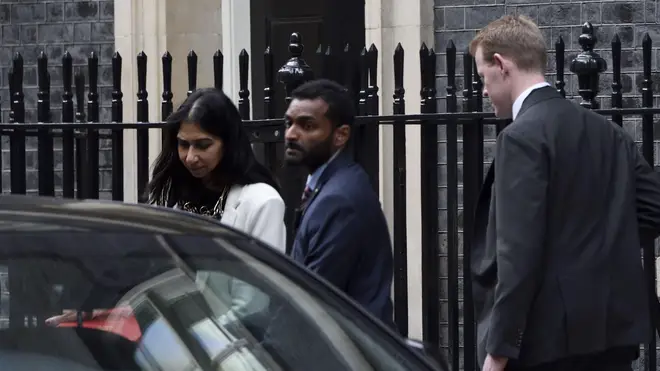
Clive Bull 1am - 4am
20 October 2022, 13:35 | Updated: 20 October 2022, 15:02

Liz Truss announces her resignation as Prime Minister
Liz Truss has resigned as Prime Minister after just six weeks in the job.
In a statement outside No10 after just 45 days in office, she said: "Our country has been held back for too long by low economic growth.
"We set out a vision for a low tax, high growth economy that would take advantage of the freedoms of Brexit.
"I have spoken to His Majesty the King to notify him I am resigning as leader of the Conservative Party."
Her government was engulfed with political turmoil, losing first Chancellor Kwasi Kwarteng off the back of the mini-budget that crashed the pound and sent household costs soaring.
Read in full: Liz Truss's resignation speech
Read more: BC callers tell Nick Ferrari the government is being ‘laughed at’ now

Then her Home Secretary resigned, apparently over a security breach for sending an official document on her personal email.
Last night Tory MPs rebelled in a chaotic parliamentary vote on fracking with allegations MPs were ‘manhandled’ into casting votes.
"This morning I met the chairman of the 1922 Committee, Sir Graham Brady," she continued.

Andrew Marr's instant reaction to Liz Truss' resignation
"We've agreed that there will be a leadership election to be completed within the next week.
"This will ensure that we remain on a path to deliver our fiscal plan and maintain our country's economic stability and national security.
"I will remain as Prime Minister until a successor has been chosen."
She said there would be a new leader elected within a week.

Sir Keir Starmer called for an immediate general election. He said: "The Conservative Party has shown it no longer has a mandate to govern.
"After 12 years of Tory failure, the British people deserve so much better than this revolving door of chaos. In the last few years, the Tories have set record-high taxation, trashed our institutions and created a cost-of-living crisis.
"Now, they have crashed the economy so badly that people are facing £500 a month extra on their mortgages. The damage they have done will take years to fix.
"Each one of these crises was made in Downing Street but paid for by the British public. Each one has left our country weaker and worse off.
"The Tories cannot respond to their latest shambles by yet again simply clicking their fingers and shuffling the people at the top without the consent of the British people. They do not have a mandate to put the country through yet another experiment; Britain is not their personal fiefdom to run how they wish.
"The British public deserve a proper say on the country's future. They must have the chance to compare the Tories' chaos with Labour's plans to sort out their mess, grow the economy for working people and rebuild the country for a fairer, greener future. We must have a chance at a fresh start. We need a general election - now."
It comes following 24 hours of chaos that saw the Home Secretary quit, confusion over whether the Chief Whip had also resigned, and MPs being ‘manhandled’ in Commons voting lobbies.
Last night Conservative MPs were confident that between 50 and 100 letters of no confidence had been submitted to 1922 chief Sir Graham Brady.
Under-fire Ms Truss - Charles's first PM - took on her role just two days before the death of the Queen, but her premiership has been as disastrous as it was record-breakingly brief.
After winning the Conservative Party leadership contest, she travelled to Balmoral in the Scottish Highlands, where the Queen had been staying, on September 6, and was asked to form a government by the 96-year-old monarch.
The Queen died just two days later, with Charles becoming King.
The nation was plunged into mourning for its longest reigning monarch for the next 12 days, amid a political pause for the new Prime Minister and Parliament.
Ms Truss had promised a "bold plan" to cut taxes and grow the economy and "deliver on the energy crisis", but the mini-budget, unveiled four days after the Queen's funeral, with its plans to abolish the top rate of income tax for the highest earners sent the markets into turmoil.
Ms Truss insisted she stood by the package but in the end sacked her chancellor, Kwasi Kwarteng, whose successor, Jeremy Hunt, ripped up the controversial budget by reversing most of the measures.
Ms Truss's stint as PM is set to be the shortest in British history, with a leadership election due to be completed within the next week.
The previous record-holder was Tory statesman George Canning, who spent 118 days as prime minister in 1827 before dying in office from ill-health.
In her statement outside Downing Street, Ms Truss said she had spoken to the King on Thursday to notify Charles she was resigning as leader of the Conservative Party.